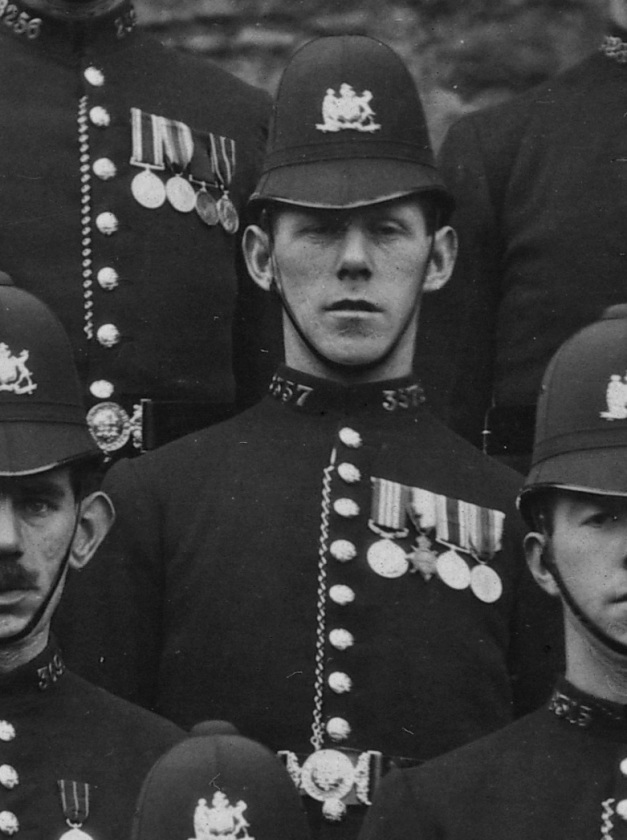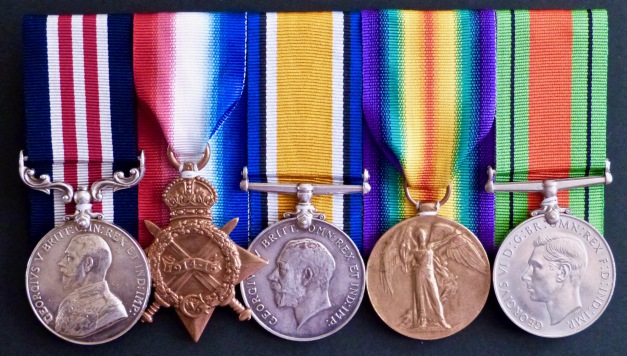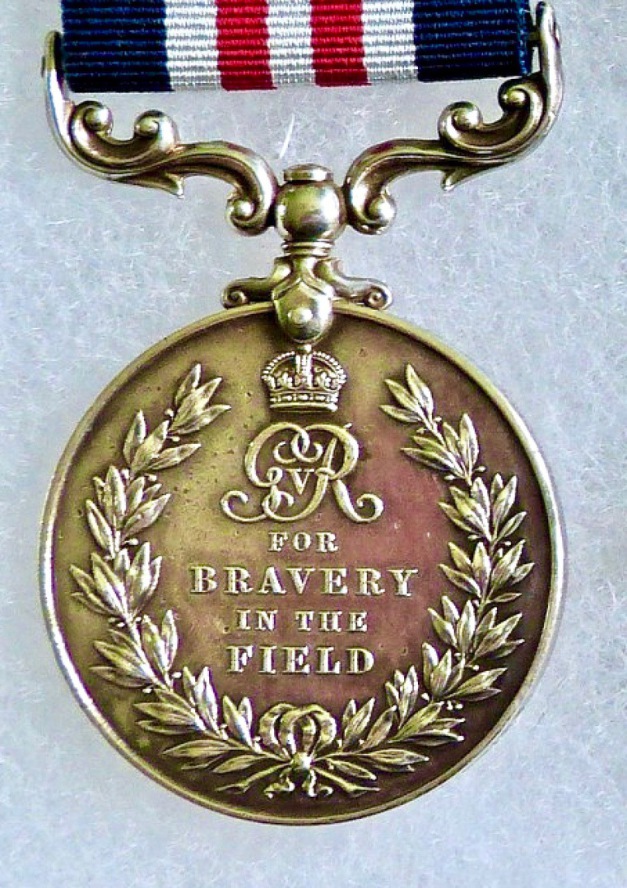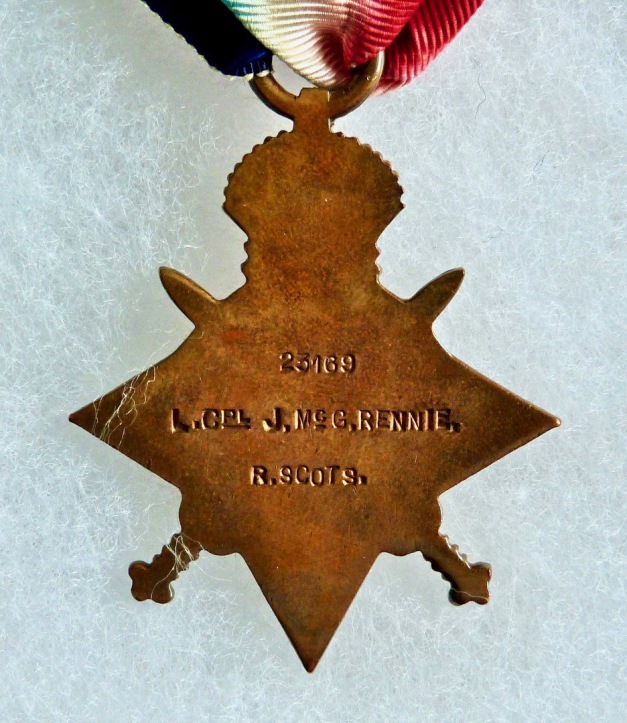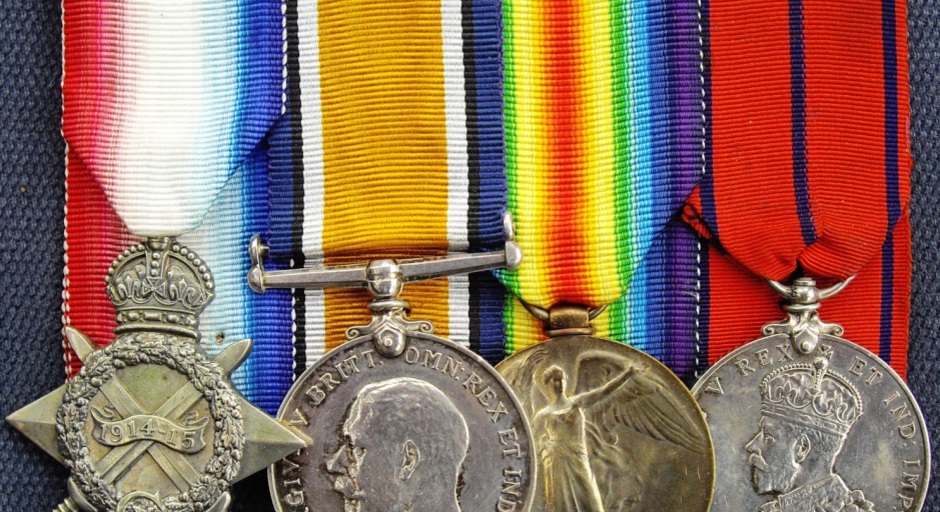
Edinburgh City Police - PC 541 D John McGhee Rennie, MM
Military Medal (London Gazette 9 December, 1916)
1914-15 Star
British War Medal
Victory Medal
Defence Medal
Edinburgh City Police
PC 357 B John McGhee Rennie
Introduction
John McGhee Rennie was born in 6 John Street, Aberdeen on 11 June, 1891, twenty minutes after his elder twin brother, Robert Rennie. Their father was James Rennie, a Farm Servant of Bents Farm near Alford and their mother, Jane McGhee, a Domestic Servant of Scotstown near Echt, both in Aberdeenshire.
Although both their parents eventually married, they never married each other.
On 31 October, 1896, at 3 Skene Place, Aberdeen, Jane McGhee, (29), a Domestic servant and Spinster, married John Barron, (26), a Farm Servant. Jane and John Barron brought up Robert Rennie as their son and he was known as Robert Barron.
A year later, on 4 June, 1897, at the Burnett Arms Hotel in Kemnay, James Rennie, (35) a Farm Servant of Wellhouse near Alford, married Maggie Scott, (25), a Domestic servant from Kemnay. James and Maggie Rennie brought up John McGhee Rennie as their son.
Robert is listed in the 1901 Census living with his step-father and mother as Robert Barron. In the same Census, John McGhee Rennie is living with his father and step-mother.
In 1911, John McGhee Rennie, (19), was probably working as a Ploughman on a farm near Alford.
He worked as a Lorryman before joining Edinburgh City Police aged 23 as PC 521 D on 15 September, 1914.
He resigned to join the Army on 1 June, 1915 and enlisted in the 13th (Service) Battalion of the Royal Scots as Private 23169 the same day.
He disembarked in France with the 13th Battalion Royal Scots on 2 October, 1915.
His award of the Military Medal (as a Corporal) was published in a Supplement to the London Gazette on Saturday 9 December, 1916 which probably means the action for which it was recognised took place approximately 12 weeks before, in September. A local newspaper that reported the award of the medal stated that he had been wounded in the Somme on 15 September, 1916. That was the day his battalion led the successful assault on the village of Martinpuich in Northern France during the Battle of the Somme.
John McGhee Rennie was promoted to Serjeant and may have spent some time at the Depot in Glencorse Barracks, Penicuik. He was certainly stationed there with the 3rd Battalion in late 1917 when he married Jeannie McInnes. He was discharged on 9 February, 1919.
He rejoined Edinburgh City Police on 11 February, 1919, again as PC 521 D and served with distinction, being commended by the Chief Constable three times. Between 1919 and 1922, he transferred from the ‘West End’ (in that year, still D Division) to ‘Gayfield’ (B Division) as PC 357 B.
13th (Service) Battalion the Royal Scots
He enlisted in 13th (Service) Battalion the Royal Scots as Private 23169 the same day he resigned from Edinburgh City Police.
The 13th (Service) Battalion Royal Scots were formed in Edinburgh in September, 1914 as part of the ‘K2’ group, ‘Kitchener’s New Army’ and after a short period of strenuous training, were sent to the Western Front, landing in France on 15 July, 1915.
By 27 July, 1915, the battalion was in the trenches as part of the 15th (Scottish) Division which fought in the Battle of Loos. The Division later fought in the Somme, the Third Battle of Ypres, Arras and many others.
After basic training, John McGhee Rennie landed in France on 2 October, 1915.
13th (Service) Battalion The Royal Scots – Life in the Trenches
The War Diary (WD) of the 13th Battalion the Royal Scots records the daily operations of the unit, reinforcements in, transfers out, casualties, killed wounded and missing, (only the Officers are named however, the ‘rank and file’ are simply stated as a number), movements in and out of the trenches, the operations taken part in, the training schemes and anything the writer thought worthy of recording. Awards for Gallantry are often recorded in the WD.
The War Diaries are available on-line from The National Archives (TNA) and are an extremely useful source of information for researchers.
13th (Service) Battalion The Royal Scots – The Battle of the Somme, September, 1916
The following excerpt is a direct quotation taken from Appendix II of the War Diary of the 13th Battalion the Royal Scots and details the operations during the action to capture the village of Martinpuich over 15 – 16 September, 1916.
|
“Appendix II
13th Bn. The Royal Scots
The Battalion relieved the 10th West Riding Regiment in Peakes Wood on August 8thwith a strength of 23 Officers and 605 other ranks. From the arrival of the Battalion on the Somme to September, 15th, on which date it had the honour of attacking (together with the 11th Argyll & Sutherland Highlanders) the village of Martinpuich, the battalion was employed on much consolidating and digging of jumping off trenches, - work after all upon which the success or failure of an attack depends.
Preparatory to attacking the SWITCH LINE the Battalion did good work in digging BUTTERWORTH TRENCH and the barricade in MUNSTER ALLEY was advanced 80 yards after a successful piece of patrol work on August, 11th when four prisoners were taken. Another patrol discovered that the SWITCH LINE opposite was practically unoccupied with the result that working parties were at once pushed out to dig communication trenches towards the SWITCH. This was done within thirty yards of the SWITCH. The Battalion was instrumental in doing a large portion of the digging which led to the capture of 120 Germans in the INTERMEDIATE TRENCH. The Battalion was relieved on the morning on which these Germans surrendered. It was felt that the Battalion was unlucky in not reaping the fruits of its labour, but this is the fortune of war.
On the night of Sept. 14th the Battalion proceeded to the trenches with 20 Officers and 672 other ranks and occupied HAM and EGG trenches preparatory to attack, which was to be made on the morning of the 15th Sept., 1916.
At 6-20 a.m. the attacking waves went over the parapet and simultaneously an intense bombardment was opened on MARTINPUICH and BOTTOM TRENCH.
The first objective was soon gained, and work of consolidation commenced.
At 9-20 a.m. strong patrols were pushed forward to the village and successfully bombed dug-outs and captured many prisoners – it is computed about 400. These patrols cleared a strip of the village of MARTINPUICH on a front of about 150 yards as far as PUSH TRENCH. Eventually the 6th Camerons, who were in support, were ordered forward to occupy PUSH TRENCH. The Battalion was relieved on 18th Sept. Having suffered 330 casualties during these operations of whom ten were Officers.
The Battalion was again in the trenches by LE SARS between 8th October and November 3rd when operations were brought to a standstill owing to the bad weather conditions.
|
Unfortunately, the copy of the 13th Royal Scots War Diary available online from TNA has the whole month of September, 1916 missing.
I believe John McGhee Rennie, by now a Corporal, took part in this action and it may have been during this that he was awarded the Military Medal (MM)?
His award of the MM was published in the Supplement to the London Gazette of Saturday 9 December, 1916. Allowing for the time-lag between the action and the award of roughly 12 weeks, it is highly likely that it was for the action at Martinpuich that John McGhee Rennie was recognised.
Supplement to The London Gazette of Friday 8 December, 1916, Published Saturday 9 December, 1916
Among the many pages of awards and decorations in the Supplement, page 12041 records that “His majesty the King has been graciously pleased to award the Military Medal for bravery in the Field to the undermentioned Non-commissioned officers and men:-
|
Page 12051
“23169 Cpl. J. M. Rennie, R. Scots”
|
His award was also acknowledged in the ‘Aberdeen Daily Journal’ of Thursday January 11th, 1917 under “Tullynessle and Forbes” local news.
|
“Tullynessle and Forbes
Local Soldier Decorated. – Corporal John M. Rennie, Royal Scots, a member of the Edinburgh Police Force, who has gained the Military Medal, is the son of Mr and Mrs Rennie, Mannobattock, Tullynessle. Joining the Army shortly after the outbreak of the war, he has been at the front for a year, and was wounded at the Somme on September, 15.”
|
I am hoping that the copy of the 13th Battalion War Diary held at the Royal Scots Museum in Edinburgh Castle is complete with the month of September included so that I confirm the action in which the award of the MM was made (25 November, 2016).
Register of Marriages in the District of St Andrew in the Burgh of Edinburgh, 1917
On 26 July, 1917, at the Manse, Royal Circus, Edinburgh, after Banns according to the Forms of the Church of Scotland, “J. M. Rennie, (26), Police Constable, Corporal, 3rd Batt. Royal Scots, Glencorse Barracks”, married “Jeannie McInnes, (27), Munitions worker, 15 Jackson Terrace, Aberdeen.”
John’s parents were “James Rennie, Farmer” and “Jane Rennie, maiden surname, Scott”.
Jeannie’s parents were Donald McInnes, Mason’s Labourer, (deceased) and Jane Adam or McInnes.
(Scott was Maggie, James Rennie’s wife’s Maiden Surname, not his birth mother, Jane McGhee).
Edinburgh City Police Weekly Record, 11 February, 1919
This records that PC 521 D John Rennie was “Re-appointed to the force with 3 years, 354 days Army Service and former Police Service counting towards pension. (Placed in 3rd Class (47/-)”
This had the effect of him being brought up to his correct pay rate and pensionable service that he would have been entitled to had he not volunteered for the Army.
Medal Index Card ‘Rennie, J. Mc G. 13 R. Scots’ WO 372/23/15844
This records that 23169 Serjeant Rennie is entitled to the 1914-15 Star as a Lance-Corporal on Medal Roll D/47/B, Page 75 and the British War Medal and Victory Medal as a Serjeant on Medal Roll D/101,B11, Page 1086, all with the 13th Battalion of the Royal Scots.
The card also records the theatre of War first served in as “(1) France”. It also confirms that he disembarked in France on 2 October, 1915.
Edinburgh City Police Weekly Record, 10 May, 1921
John Rennie, by now PC 357 B stationed at Gayfield Square, Edinburgh, was “Specially Commended” this day for “for courageous conduct in stopping a runaway horse.”
Edinburgh City Police Weekly Record, 26 June, 1923
John Rennie, PC 357 B was “Commended” this day for “Tact and vigilance displayed in securing the arrest of two shop breakers.”
Register of Deaths in the District of East Peterculter in the County of Aberdeen, 1924
On 7 March, 1924, at Gardeners Cottage, Drumgarth, Aberdeenshire, Margaret Rennie, (60), married to James Rennie, Farmer, died. Her parents were listed as James Scott, a Quarry Worker and Isabella Copland or Scott, both deceased.
Margaret’s death was registered by her son-in-law, James Morrison of the Gardener’s Cottage, Drumgarth.
Valuation Roll for the Burgh of Edinburgh, 1925 – 1926
Listed living as a tenant of 13 Dean Park Crescent, Edinburgh in that year was “John McGhee Rennie, Police Constable”.
The address was clearly approved as suitable for police officers to reside there since four of the flats were so occupied.
Edinburgh City Police Weekly Record, 16 November, 1926
John Rennie, PC 357 B was “Commended” this day for “vigilance and promptitude displayed for securing the arrest of a man suspected of house breaking.”
Valuation Roll for the Burgh of Edinburgh, 1930 – 1931
Still listed living as a tenant of 13 Dean Park Crescent, Edinburgh in that year was “John McGhee Rennie, Police Constable”.
Edinburgh City Police Weekly Record, 31 December, 1945
On this date, John McGhee Rennie retired from Edinburgh City Police. He is entitled to a Defence Medal for his War Service. He was also awarded 5 War Service chevrons, as that fact is recorded in his personnel record.
John McGhee Rennie, (70), died on 19 April, 1962 in Edinburgh Royal Infirmary as a result of a head injury sustained in a collision between two motor vehicles. His usual address was in Gladsmuir in East Lothian.
